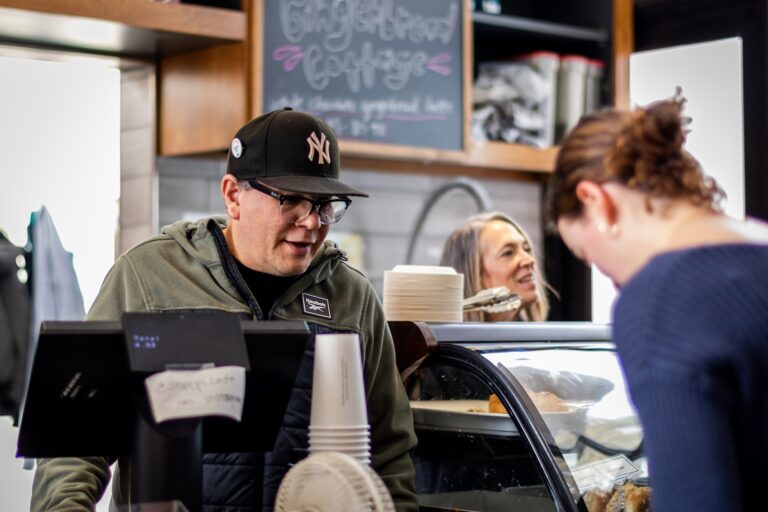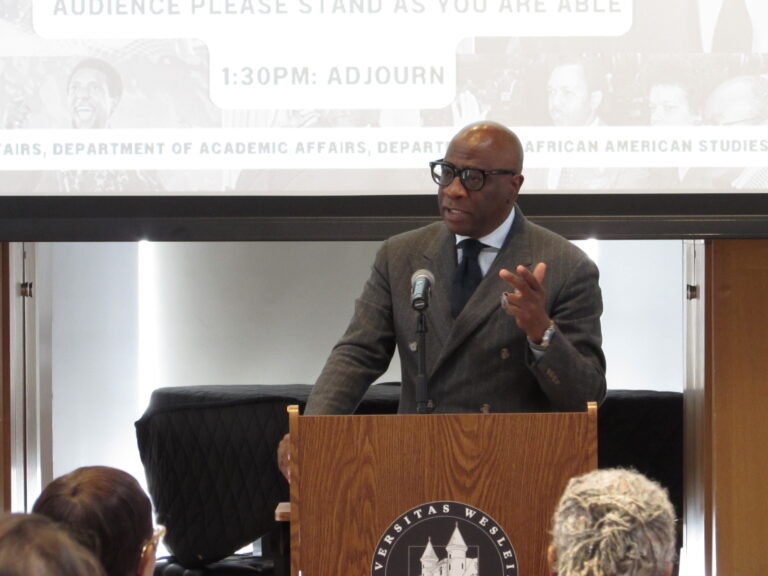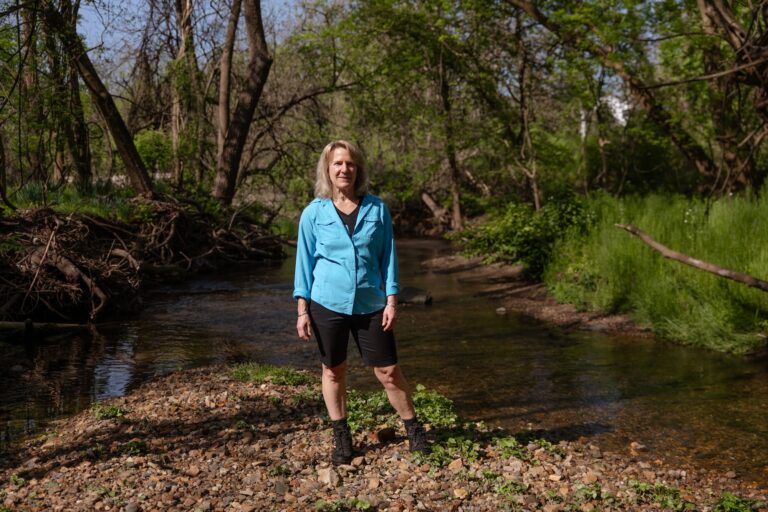Obama encourages public service in commencement address
In his commencement address, Senator Barack Obama (D-IL) directly challenged the class of 2008 to commit themselves to community involvement and global engagement. Obama filled in for Senator Edward Kennedy (D-MA), whose recent diagnosis with a malignant brain tumor prevented him from speaking at the event.
Addressing the 10,000 seated audience members, as well as a packed Foss Hill, Obama spoke on Kennedy’s intended topic of service to one’s country.
“At a time of war, we need you to work for peace,” he said. “At a time of inequality, we need you to work for opportunity. At a time of so much cynicism and so much doubt, we need you to make us believe again. That’s your task, class of 2008.”
This call to public service was a theme throughout Sunday’s 176th Commencement. President Michael Roth similarly implored the 737 undergraduates and 100 graduate students to push for positive change in an increasingly troubling world.
“This year’s graduates, like Wesleyan alumni before you, will contribute to shaping our culture in the future, because otherwise it will be shaped by people for whom creativity and change, freedom and equality, diversity and tolerance, are much too threatening,” Roth said. “We are counting on you to help shape our culture, so that it will not be shaped by forces of oppression and violence.”
Obama drew on his experiences as a community organizer in the South Side of Chicago to illuminate the difficulties of public service, while still assuring graduates of their potential to make change.
“Should you take the path of service, should you choose to take up one of these causes as your own, know that you’ll experience frustrations and failures,” he said. “Even your successes will be marked by imperfections and unintended consequences…But I hope you’ll remember, during those times of doubt and frustration, that there is nothing naïve about your impulse to change the world.”
Audience members excitedly praised Obama’s oratory skill and challenging message.
“His call to graduates and all of us to live lives underscored by service to others is probably the best thing to say to young people in particular,” said Chair of the English department Ann duCille. “Having come of age in the 1960s, in a moment in history when we thought we would change the world, it means a lot to me and others of my generation to hear of change not just spoken, because that’s just rhetoric, but felt in the air.”
Ben Nwachukwu, who attended commencement to see friend Justin Douglas ’08 graduate, also enjoyed both the delivery and substance of Obama’s speech.
“His message was about reaching out to our community, to young students everywhere,” he said. “He’s like a rock star everywhere he goes. It was just cool to be in his presence.”
Obama remained present after giving his speech, and individually shook each graduate’s hand as they processed onstage.
Despite on-campus excitement for Obama’s appearance, multiple speakers expressed regret for Kennedy’s absence. After his May 17 hospitalization, the University was unsure if Kennedy would still be able to deliver the commencement address. On May 22, however, the University announced that Obama would be filling in for Kennedy as a personal favor.
Kennedy’s stepdaughter, Caroline Raclin ’08, was among the graduates. His son, Edward Kennedy Jr. ’83, celebrated his 25th class reunion over the weekend. Senator Kennedy’s wife, Victoria Reggie Kennedy and son, Congressman Patrick Joseph Kennedy also attended Sunday’s ceremony.
In his address, Obama praised Kennedy’s public service record, which includes improving healthcare and health insurance, raising minimum wage, and strengthening public education. He called on the graduates to take inspiration from Kennedy’s many achievements.
“Surely, if one man can achieve so much and make such a difference in the lives of so many, then each of us can do our part,” he said. “Surely, if his service and his story can forever shape America’s story, then our collective service can shape the destiny of this generation. At the very least, his living example calls us to try.”
Adrienne Shea ’08 found Obama’s references to Kennedy’s legacy effective.
“I thought it was classy that he incorporated Ted Kennedy’s themes, but used his own experiences to elaborate on that,” she said.
Once Obama agreed to replace Kennedy, the University had less than four days to orchestrate the arrival a high profile speaker on campus. After the University met with multiple law enforcement agencie—ncluding the Middletown Police Department, Connecticut State Police and the United States Secret Servic—t was decided that several changes would be made to the event to ensure safety.
While commencement is traditionally an open event, this year graduates’ guests were allotted 10 tickets for the priority seating on Andrus Field. Foss Hill, however, offered first-come, first-serve spots on the grass. Onlookers also flocked to standing areas in front of Usdan and College Row. Almost a mile of gated fence cordoned off the graduates and their guests from surrounding spectators, according to Associate Vice President for Facilities Joyce Topshe.
Secret Service agents screened all graduates and media personne—hich ranged from The Hartford Courant to The New York Times to Fox New—efore they could gain access to their allotted areas on Andrus Field. Additionally, several agents stood watch on the roofs of Olin Library and Zelnick Pavilion.
Despite the increased security and national attention, a sense of humor and lightheartedness was felt throughout the ceremony. The student Taiko Drumming Ensemble performed the processional and recessional music, their thunderous, percussion-heavy sound providing a lively alternative to the sober “Pomp and Circumstance” traditionally chosen for graduation ceremonies.
Roth welcomed the audience with a simple declaration.
“Wesleyan, you are very cool,” Roth said to open the ceremony.
Senior Class President Rashida Richardson ’08 began her speech by referencing the common mix-up between Wesleyan University and Wellesley College. This was recently brought up when Fox News erroneously joked that Obama was speaking at Senator Hillary Rodham Clinton’s (D-NY) alma mater Wellesley.
“Today, we step out of this bubble we call Wellesley,” she said.
Richardson continued this tone throughout her address, closing with a sly reference to the homogeneity of Wesleyan post-grad destinations.
“I look forward to seeing y’all when we move to New York,” she said.
After receiving an honorary degree, President of Williams College Morton Schapiro poked fun at both the event’s heightened security and the rivalry between Williams and Wesleyan.
“I bet you had no idea that the president of Williams traveled with so much Secret Service,” he said.
Other recipients of honorary degrees included Obama, author Jamaica Kincaid and photographer and retired lawyer Philip Trager ’56. Additionally, Professor of Religion Elizabeth McAlister, Professor of Letters Howard Needler and Professor of History and African American Studies Renee Romano were all awarded Binswanger Prizes for Excellence in Teaching.
The University also recognized several retiring faculty members: Adjunct Professor of German Studies Vera Grant, Professor of English and African American Studies Gayle Pemberton, Professor of English Richard Slotkin and Professor of Biology Jason Wolfe.
According to commencement updates on the University website, Obama’s appearance was not part of his political campaign. In his speech, however, Obama explicitly pointed to some of his presidential campaign’s proposals.
“As President, I intend to grow the Foreign Service, double the Peace Corps over the next few years, and engage the young people of other nations in similar programs…” he said.
While reactions to the speech were overwhelmingly positive, some members in the audience, like Joanna Mayo P ’08, still found Obama’s direct references to his political campaign unsettling.
“It was a great speech,” Mayo said. “I was a little disappointed when it turned into a stump speech, but other than that it was good.”
Inslee Coddington ’10 echoed Mayo’s sentiments, adding that such references were unnecessary.
“I can’t say I was surprised at all, but I was kind of disappointed,” she said. “I think he could’ve had the same message and used the same anecdotes without actually saying, ’As president, I will…’”
Some reasoned, however, that not only were certain supposedly political parts of Obama’s speech inevitable, but they were also harmless.
“You can’t deny that he’s running for president,” said Hilary Burke ’10. “But he did only mention the class of 2008 three times.”
“I got nervous when he talked about the presidency,” Shea said. “But he was just using his background and experience to talk about service to our country.”
Overall, however, commencement attendees were pleased with Obama’s appearance.
“I think it was a phenomenal culmination of the Wesleyan experience to have Barack Obama come and speak,” said Patrick Senat ’08.
Nate Kaufman ’08 reflected that though he is unsure of his post-graduate plans, he hopes to apply Obama’s message to his future endeavors.
“I’ll service my community,” he said with a smile.







Leave a Reply